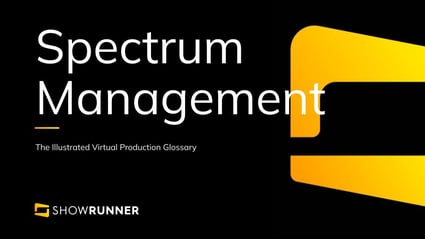Spectrum management is a Systems Integration term in filmmaking. In virtual production, the nuances of this term take on special meaning. Here, we break down the definition to give you a starting point.
View the full Virtual Production Glossary here »
Basic Definition:
What is Spectrum management in virtual production?
Spectrum management is an essential part of any virtual production. It is the process of managing all of the various wireless hardware, such as non-visible infrared tracking systems and radio frequency signals, in a stage or volume to prevent crosstalk and interference from occurring. It is typically handled by technicians responsible for audiovisual equipment on set.
A key component of successful spectrum management is understanding the nature of these various types of waves, their frequencies, and how they interact with each other. For example, if two RFs are operating within too close a proximity, it can cause signal interference and problems such as latency or even dropped frames. This knowledge should be used to inform decisions about where to place antennas, receivers, transmitters, and other hardware. Additionally, keeping a log of every piece of hardware you're using on set helps maintain clarity regarding what's being sent out into the airwaves.
In terms of best practices for successful spectrum management, proper labeling of all devices is vital - both for troubleshooting purposes and for safety reasons. Labeling can also help organize multiple productions running simultaneously on the same stage or location. In addition, having sufficient antennae on hand will ensure that the necessary range is covered. Lastly, experienced producers may opt to use automated spectrum monitoring software programs which allow them to manage their radio frequencies remotely, eliminating manual labor and improving efficiency.
All in all, spectrum management plays a critical role in ensuring smooth and uninterrupted flow of data between computers and other technology on a virtual production set. By developing familiarity with different types of waves, understanding device placement rules and leveraging modern technologies, producers can remain in control of their sets and make sure that everything runs smoothly.arious wireless hardware, including non-visible infrared tracking, etc, on a stage or volume to avoid crosstalk and interference.
-1.png?width=290&name=Profile%20Pic%20(2)-1.png)
-1.png?width=2539&height=346&name=Transparent%20(2)-1.png)
